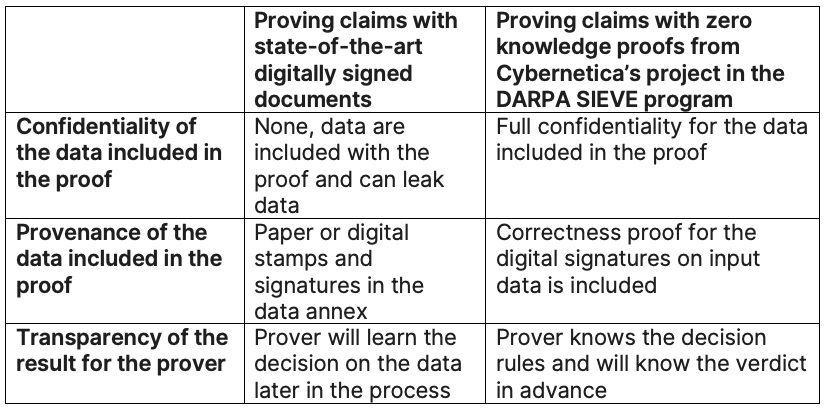“We are developing a new generation of digitally signed documents, ones that convince the recipient of the claim while giving the signer privacy and transparency beyond what is possible today.”
Cybernetica demonstrated a solution for confidentially proving the location or trajectories of people of vehicles at the DARPA Pentagon Demo Day. DARPA, the research and development agency of the United States Department of Defense, invited select performers of its research programs to Washington D.C. to present their results at the Pentagon.
Cybernetica’s solution consists of a custom GPS tracker, a smartphone and a server for receiving proofs. The GPS tracker can be attached to a vehicle, person or any other object to regularly log its coordinates of the trip in a tamper-evident log. The smartphone loads the trip information from the tracker and composes a cryptographic zero-knowledge proof that the tracked object has been in a specific region over a specific time. This proof is presented to the server that will check the cryptography and will either be convinced of the claim or not. In either case, the server will not see the trip coordinates.
“Cybernetica has created a tool that makes the creation of zero-knowledge proofs faster and simpler for many domains,” explained Dr Peeter Laud, Cybernetica’s Principal Investigator in the DARPA SIEVE program where the technology was developed. “We can prove compliance to health standards from electronic health records, prove to business partners that a web server has not been hacked or prove that an artificial intelligence system reached a certain verdict – all while keeping the sensitive source data a secret”, he added.
“We were honoured to be invited to the Pentagon Demo Day,” stated Dr Dan Bogdanov, Chief Scientific Officer of Cybernetica, who was on site in Washington D.C. for the presentation. “We are developing a new generation of digitally signed documents, ones that convince the recipient of the claim while giving the signer privacy and transparency beyond what is possible today.”
Cybernetica performed the work in the DARPA SIEVE (Securing Information for Encrypted Verification and Evaluation) program. The demonstrator contained cryptographic technology developed by Galois Inc, a US company also working in the SIEVE program.
This research has been funded by the Defense Advanced Research Projects Agency (DARPA) under contract HR0011-20-C-0083. The views, opinions, and/or findings expressed are those of the author(s) and should not be interpreted as representing the official views or policies of the Department of Defense or the U.S. Government.
Supplementary material: How to prove being driving in a region without sharing the precise coordinates?
Cybernetica’s technology
Zero-knowledge proofs are a cryptographic technology for allowing a prover to make a verifier believe a statement without showing all the related data. It has successfully been used for applications like digital currencies, cryptocurrencies and also internet voting protocols.
In the DARPA SIEVE program, Cybernetica has developed the ZK-SecreC toolkit for speeding up the creation of secure, correct and highly efficient zero-knowledge proofs for showing that a certain computation has been performed on some input data. This computation can include any kind of business logic, e.g., checking data against requirements, but also checking the integrity of the input data by validating digital signatures on it.
Cybernetica’s tools work with various cryptographic zero-knowledge technologies and Cybernetica foresees an ecosystem of applications built using this technology. For more details on ZK-SecreC, see sources here and here.
Comparison to the state of the art

Inspiration for Cybernetica’s demonstrator at the Pentagon Demo Day
Cybernetica’s demonstrator was inspired by a version of the requirements of the Estonian electric vehicle subsidy with geopositioning terms. According to these terms, the electric vehicle would have to drive 80 000 km over four years and at least 80% of that would have to be driven in Estonia, all in order to qualify for an up-to 5000€ subsidy.
We saw how Cybernetica’s zero-knowledge proof technology could allow for enforcing these terms without requiring that the vehicle buyer discloses their driving data (whether GPS trail, country codes or mileage). We developed an initial prototype and found that the concept is feasible with today’s prototype technology.
After studying EV subsidy compliance monitoring, we are now planning to study similar application cases - like highway taxation and vehicle taxation. While the technology is not ready for immediate deployment, we are preparing to transition the technology towards applications.
Additional applications of the technology
In the defence domain:
- Proving the forward placement of equipment in a territory.
- Proving patrol, escort or cargo delivery across a territory.
In compliance:
- Proving adherence to a military or civilian health standard based on (digitally signed) health records
- Proving adherence to funding rules based on (digitally signed) bank statements.
In cybersecurity:
- Proving to one’s partners that a server has not been compromised with a cyberattack like log4shell, based on server access logs.
In law enforcement:
- Proving having been at a location by matching facial images, phone location data and credit card transactions to data from that location.
